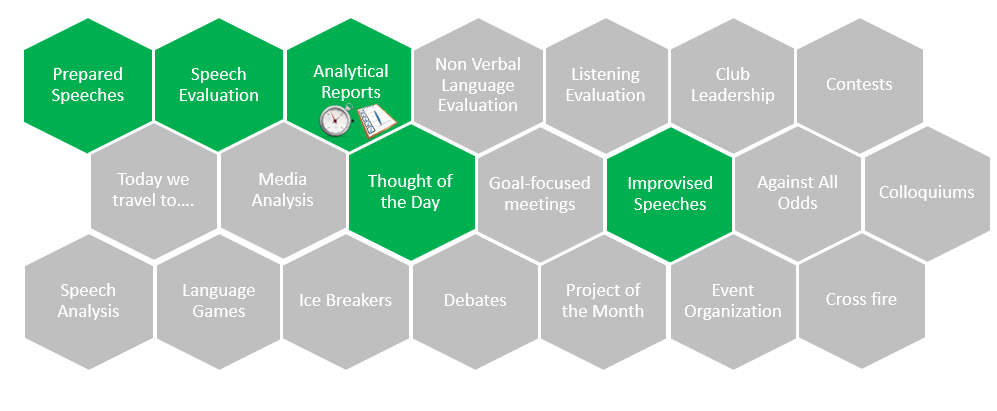This Basic Agenda is intended for clubs that have just chartered and where the members don't have any prior experience with Agora. It should be used until the club is comfortable with all the roles present in it. Once all the members have a good grasp of how these work and a Vice President of Education has been elected, they can start adding new activities from the available set.
It is suitable even for the first meeting, and it requires a minimal number of people to execute while at the same time being very educational and fun. Of all the possible meeting activities, it features a basic set of them:

Agenda
This basic agenda requires at least 8 people, and it has the following roles:
- A Meeting Leader.
- A Speaker that would do the first speech project. "Speaking About the Things that you like" (Project #2 from the Basic Educational Path)
- A person that would like to do the "Thought of the day" activity.
- A Timer
- A Grammarian. He should also act as Filler-word counter.
- A Speech Evaluator to evaluate the speaker. The speech evaluator should also read this article on how to do effective evaluations and the speech project itself, which contains the evaluation card and criteria.
- A Hot Questions Master.
- A Meeting Evaluator.
Participants should volunteer for the different roles, or they can be assigned randomly if there's no agreement.
Once assigned, everyone should familiarize themselves with what the role needs to do by reading the linked materials.
If there are more than 8 participants, you can add additional "Thought of the day" roles or speeches and evaluations.
Materials - Physical Meetings
For carrying out a meeting with this format, you will need the following materials.
- An agenda with the sections and who's going to be doing each of them. Here you have a suggested word template that you can customize. There's no need to fill in the Officer roles at this point.
- A stopwatch or mobile phone with a timing app for the timer.
- A set of red, green, yellow signals (can be three sheets of colored paper) to serve as timing signals.
- A sheet of paper for the timer's report. You can use this word template.
- A sheet of paper for the grammarian's report. You can use this word template.
- General evaluation forms. You'll need one per attendee per speech. So, for example, if you have two people doing speech projects and 10 attendees, you'd need 20 forms. Here you have a simple template (PowerPoint) and a more elaborated template (photoshop). You can personalize both of them with your club information. If you don't have PowerPoint or time to personalize, you can simply print this generic PDF form.
- The evaluation card for every speech project. Evaluation cards are at the bottom of each project, so for "Speaking About the Things that you like", scroll to the bottom to find it.
- The grammarian will need to prepare a sheet of paper with his chosen word of the day. The word should be written in large enough letters so that everyone can see it.
- Pens for everyone.
Materials - Online Meetings
If the meeting is online, there's much less to be done as most of the elements are available online, and our Asset Creator can generate them.
The most important aspect of online meeting materials is to make sure that:
- Evaluators know where to find the Evaluation Card for the corresponding project. (These are located at the bottom of each project, role, or activity)
- The Timer needs to decide how he or she is going to signal the time. Again, you can use our Asset Creator to generate Zoom backgrounds with different suitable colors.